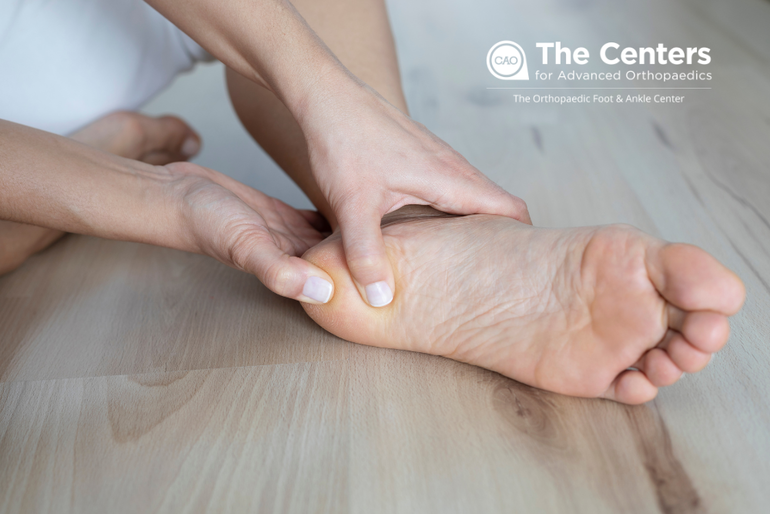The Centers for Advanced Orthopaedics is redefining the way musculoskeletal care is delivered across the region with locations throughout Maryland, DC, Virginia and Pennsylvania.
Understanding and Managing Plantar Fasciitis

If you’ve ever experienced a sharp pain in your heel during your first few steps in the morning, you might be dealing with plantar fasciitis. This prevalent condition results from inflammation of the plantar fascia, the thick band of tissue connecting your heel bone to your toes. At The Orthopaedic Foot & Ankle Center, we’re dedicated to helping you understand and manage this common foot issue effectively.
Who is at Risk?
Plantar fasciitis can affect anyone, but certain factors can increase your likelihood of developing this condition:
- Gender and Weight: Women and individuals carrying excess weight are more susceptible.
- Occupation: Jobs requiring prolonged standing or walking on hard surfaces can contribute to the onset.
- Exercise: Regular walkers and runners, particularly those with tight calf muscles, are at increased risk.
- Foot Structure: Extremely flat feet or very high arches can predispose individuals to plantar fasciitis.
Symptoms and Diagnosis
The hallmark of plantar fasciitis is a sharp pain at the bottom of your heel, often described as stepping on a stone. This pain typically intensifies after periods of rest, such as when you take your first steps in the morning or after sitting for a long time. Over time, untreated plantar fasciitis can lead to chronic pain and alter your walking pattern, potentially causing knee, hip, and back problems.
Effective Treatment Options
Physical Therapy: Engaging in physical therapy can be crucial for alleviating pain and preventing recurrence. A physical therapist can guide you through exercises and techniques specifically designed to strengthen the muscles in your foot and calf, improve flexibility, and support healing.
Medication: Over-the-counter nonsteroidal anti-inflammatory drugs (NSAIDs) like ibuprofen or naproxen can help reduce inflammation and alleviate pain. Always follow the recommended dosage and take the medication with food to prevent stomach issues.
Supportive Footwear and Custom Orthotics: Proper footwear with shock-absorbing soles and custom orthotics designed specifically for your foot shape can provide significant relief and support.
Advanced Treatments
When conservative treatments don’t yield results, additional interventions may be necessary:
- Steroid Injections: These can offer substantial pain relief by reducing inflammation.
- Walking Cast or Splint: Wearing a walking cast for a few weeks or a night splint can help manage severe symptoms.
- Regenerative Medicine: Your provider may also recommend shock wave therapy (EPAT), platelet-rich plasma, amniotic injections, or other forms of regenerative medicine treatments to help relieve pain.
- Surgery: In rare cases, surgery may be required to release the tight fascia.
Preventive Measures
Preventing plantar fasciitis involves maintaining flexibility and strength in your lower legs. Regular stretching, wearing supportive shoes, and avoiding excessive pressure on your feet can make a significant difference. Additionally, maintaining a healthy weight can reduce the strain on your plantar fascia.
At The Orthopaedic Foot & Ankle Center, we aim to help you get back on your feet without pain. Most individuals see significant improvement within two months of consistent, non-invasive treatment. If you’re experiencing symptoms of plantar fasciitis or have concerns about your foot health, don’t hesitate to contact us. We’re here to provide personalized care and support every step of the way. By understanding your condition and committing to a comprehensive treatment plan, you can overcome plantar fasciitis and enjoy a more active, pain-free life.